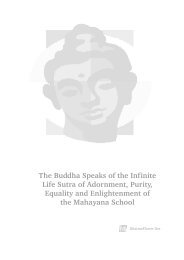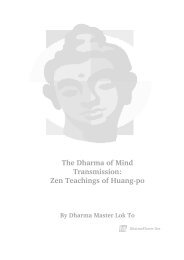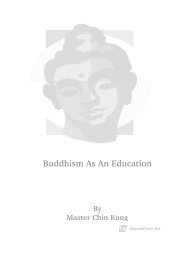Vipassana Meditation : Lectures On Insight Meditation by Venerable
Vipassana Meditation : Lectures On Insight Meditation by Venerable
Vipassana Meditation : Lectures On Insight Meditation by Venerable
Create successful ePaper yourself
Turn your PDF publications into a flip-book with our unique Google optimized e-Paper software.
an experience can be attained in the first part of the fourth stage of insight. Ifhe understands that, he should just observe the experience he has attained atthis stage. Whatever he is experiencing at this stage, he will not becomeattached to it if he observes his experience very attentively and energetically.When the meditator notes it attentively and persistently, that happiness,tranquility or serenity will not be manifested in his mind very distinctly.What he realizes at that moment is just feeling that arises and passes away.Then another feeling arises and passes away. He cannot differentiate betweenpleasant and unpleasant feelings, there<strong>by</strong>; he becomes detached from hisexperience and proceeds to practice for a higher stage of insight. <strong>On</strong>ly then canhe go beyond this stage of insight.If a meditator walks very mindfully, noting the six parts of the step: liftingof the foot, raising of the toes, pushing the foot forward, dropping it down,touching, and pressing, and as a result, his concentration is good, deep andstrong, he will not be aware of the form of the foot. Nor is he aware of thebody or bodily form. What he knows is just movement of the foot. Themovement may also feel light; he may feel as if he is walking in the air. Hemay feel as if he is lifted in the sky. At this stage, he is experiencing excellentmeditation experiences. If he does not observe these experiences mindfully, hewill like them and may desire more of them. He may become very satisfiedwith his practice and he may think this is nibbána (the cessation of all kinds ofsuffering) because this is the best experience he has ever had. All this happensbecause he does not observe his pleasant experiences, and so is attached tothem. This attachment arises depending on the pleasant feeling or pleasantsensation about his good experience.If a meditator enjoys this pleasant feeling or sensation about his goodexperience without being mindful of it he is sure to become attached to it. So,he should observe and be aware and mindful of whatever experience he hasencountered at this stage. He must not analyze it or think about it, but must beaware of the experience as it really occurs, in order to realize that thisexperience of the mental process or mental state is subject to impermanence.Whenever he notes, he finds that the experience is not everlasting. When the'noting mind' becomes constant, sustained and powerful, it penetrates into thenature of his experience, i.e. the mental state. The mind begins to realize thatthe experience has disappeared. Whenever it arises, the mind notes it, andagain it disappears. He then concludes that this pleasant feeling together withhis experience is impermanent (anicca), because he has comprehended thenature of impermanence through his personal experience of the Dhamma.Here, Dhamma means mental as well as physical processes. Because he hasrealized that the pleasant feeling or sensation together with the goodexperience is impermanent, he will not be attached to it. Attachment will notarise when the meditator rightly understands the true nature of good mentalstates or a good experience.27









